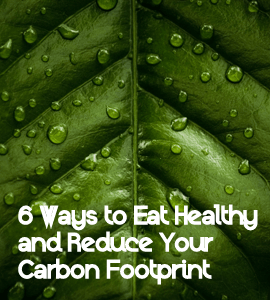Cut back on animal foods–such as meats and cheese–and shift to more organic, locally grown plant foods, including beans, vegetables and grains, to slash your carbon footprint.
All the attention on climate change brings into focus the role you can play to help protect our planet through your everyday food choices. From the demand for local, sustainable and organic food and the resulting spike in the number of farmers markets, community supported agriculture (CSAs), and organic foods, our intent is clear. Many people strive to reduce their environmental impact by making diet changes that lower their carbon footprint.
Plant-based Foods
Choosing a plant-based diet that emphasizes fruits, vegetables, beans, lentils, soy foods, grains, nuts, and seeds over animal foods has the biggest impact on lowering your carbon footprint. Meat requires many more pounds than its weight in grain feed, which has to be grown, irrigated, processed, packaged, and shipped. And, as grain-fed cattle digest their feed, they release more GHG emissions in the form of methane and nitrous oxide, which can trap heat and result in climate change.
The Environmental Working Group (EWG) calculated the carbon footprint, based on GHG emissions, generated before and after 20 popular types of conventionally grown and raised meats, fish, dairy and vegetable proteins leave the farm. Lamb, beef, cheese, pork, and farmed salmon, respectively, generate the highest GHG emissions, use the most resources to produce, and are most damaging to the environment.
Even if you don’t want to shift to an entirely plant-based diet, you can make a difference by cutting back on animal foods.
Organically Grown Foods
Choosing organically grown and raised products has less impact on the environment because fewer chemical pesticides and fertilizers are used. Organic animal products have no synthetic hormones or antibiotics. Look for the USDA Certified Organic label or inquire at your farmers market where foods may be organic, just not certified as such.
EWG recommends organic, humane, and/or grass-fed meat, eggs and dairy products, which are the least harmful to the environment.
Locally Produced Foods
Eating locally reduces GHG emissions by lowering the number of miles your food travels. A little research can reveal local farms, cooperatives, CSAs, and farmers markets. Reducing your carbon footprint through these options can make a difference, especially when compared to the GHG emissions of many supermarket foods.
Of course, it doesn’t get any more local than your own backyard. Growing your own food, even if it’s a window box of herbs or a rented plot in a community garden, is ideal, organic and healthy.
Seasonal Foods
Eating seasonally has many benefits, including cost, flavor, freshness, supporting local agriculture and good health, says Gail Feenstra, Food System Coordinator at the Agriculture Sustainability Institute atUniversity of California-Davis.
“If a food is in season, it’s not being produced in a heated greenhouse, a high consumer of energy,” Feenstra says. Choose produce in season, even when shopping at a supermarket.
Minimize Waste
A little planning and ingenuity is all it takes to minimize food waste, which contributes almost a quarter of food related GHG emissions. Save leftovers by incorporating them into soup, freezing, or drying them. If it’s absolutely got to go, compost it, says Feenstra. With composting, she says, “you’re adding it back (to the earth), not losing it,” as well as all the energy that went into producing and transporting it.
Reduce Processed Foods
When possible, purchase whole foods instead of processed and packaged foods, which not only take more energy to produce, but have excessive package waste.
Every move forward makes a difference, no matter how insignificant it may seem. Whether you go meatless on Mondays, choose poultry over red meat, or eat leftovers rather than wasting them, you’re thinking about the consequences of your food choices: The planet wins and we do, too.
– Lori Zanteson, Environmental Nutrition Newsletter
Reprinted with permission from Environmental Nutrition, a monthly publication of Belvoir Media Group, LLC. 800-829-5384.www.EnvironmentalNutrition.com.

